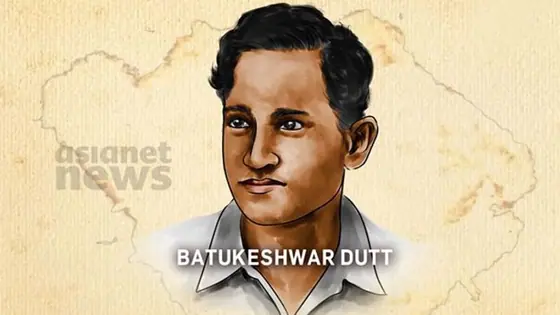
India@75: Batukeshwar Dutt, the revolutionary who deserved more
When Bhagat Singh was sentenced to death in the Lahore conspiracy case, Batukeshwar Dutt was sent to life imprisonment at Andaman's Cellular jail. After his release from jail, Dutt contracted tuberculosis. Yet he participated in the Quit India agitation and courted imprisonment for four more years. He was interred at the Champaran prison in Bihar. Dutt did not receive due recognition in independent India and died in poverty in 1965.
8 April 1929 - Delhi Central Legislative assembly: Vithalbhai Patel, the founder of the Swaraj Party and the brother of Sardar Patel, was the Speaker. Even as he rose to announce a debate on public safety, a massive explosion rocked the House. Two bombs had exploded in the midst of the assembly. It was fire and smoke everywhere.

Also See: India@75: The unknown story of women freedom fighters from Assam
Two British members fell down with injuries. Two young men who hurled the bombs stood in the smoke-filled visitors' gallery, refusing to escape and shouting Inquilab Zindabad. They were Bhagat Singh and Batukeswar Dutt. Their action was to avenge the death of their hero, Lala Lajpat Rai, after having sustained serious injuries from the police beating a few months earlier.
Later, when Bhagat Singh was sentenced to death in the Lahore conspiracy case, Dutt was sent to life imprisonment at Andaman's Cellular jail.
Dutt was born in the Bardhaman district of West Bengal in 1910. He joined Bhagat Singh's HSRA while studying in Kanpur. He became an expert in bomb-making. The HSRA had initially selected Dutt and Sukhdev for the bomb attack at the assembly as Bhagat Singh was planning a tour abroad. But Singh later changed his travel plan and joined Dutt in action.
After his release from jail, Dutt contracted tuberculosis. Yet he participated in the Quit India agitation and courted imprisonment for four more years. He was interred at the Champaran prison in Bihar. Dutt did not receive due recognition in independent India and died in poverty in 1965. He was laid to rest at the martyr's column in Hussainiwali in Ferozepur, Punjab, on the banks of Sutlej, the memorial for Bhagat Singh and his comrades.
Also Read: India@75: Group of revolutionary women who took arms against the British empire
Also Read:India@75: JRD Tata, the man who demolished the white man's prejudices